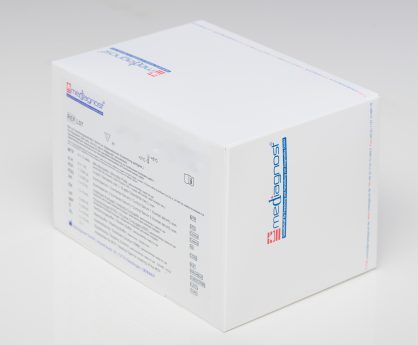Rat Adiponectin ELISA Assay
The Rat Adiponectin ELISA Assay is For Research Use Only
Size: 1×96 wells
Sensitivity: 0.08 ng/ml
Incubation Time: 2.5 hours
Sample Type: Serum, Plasma
Sample Size: 10 µL
Manufactured by Mediagnost
Assay Principle
The Eagle Biosciences Rat Adiponectin ELISA Assay Kit is a so-called Sandwich-Assay using two specific and high affinity antibodies. The Adiponectin in the samples binds to the first antibody coated on the microtiter plate. In the following step the second specific anti-Adiponectin-Antibody binds in turn to the immobilised Adiponectin. The second antibody is biotinylated and will be applied in a mixture with a Streptavidin-Peroxidase-Enzyme Conjugate. In the closing substrate reaction the turn of the colour will be catalysed quantitatively depending on the Adiponectin-level of the samples.
Sensitivity
The analytical sensitivity of the Eagle Biosciences Rat Adiponectin ELISA yields < 0.081 ng/ml (equal to 0.0081ng per well; as 2xSD of zero standard in 16fold determination).
Related Products
Mouse Adiponectin Assay
Human Adiponectin ELISA Assay
Adiponectin High Sensitive ELISA Kit


